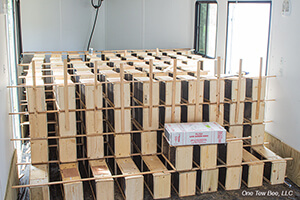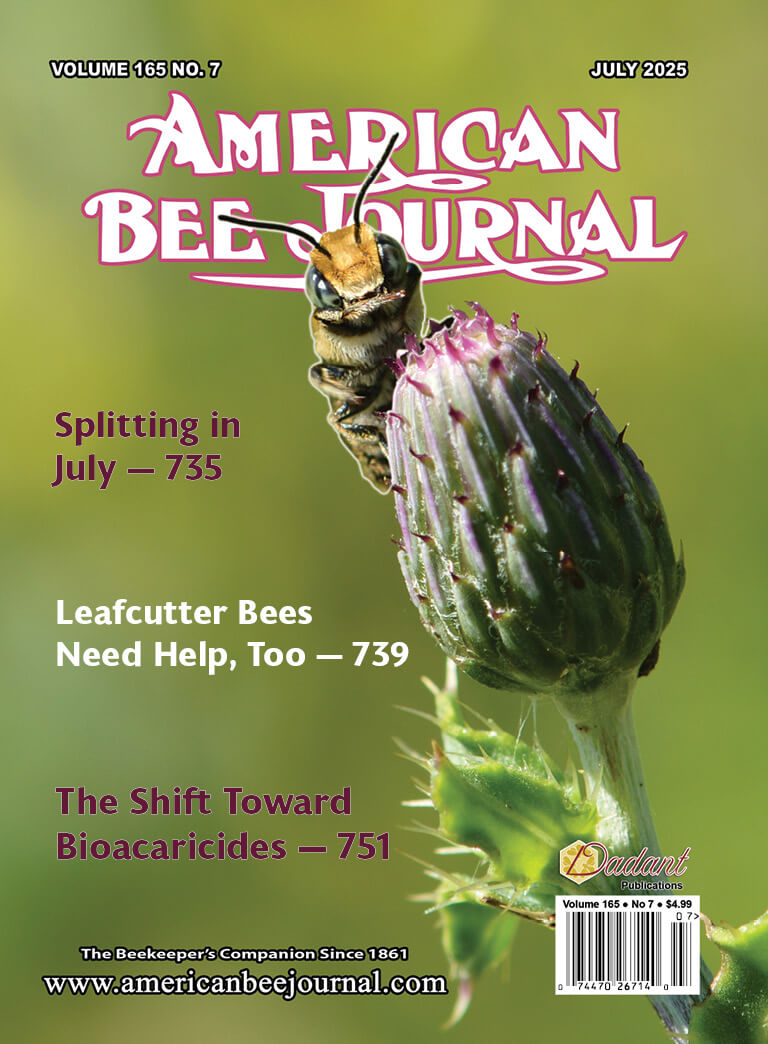Archived Columns
Hauling Bee Packages Some suggestions, comments, and stories

Yes, you can probably do this job
Why wouldn’t you go get your packages? After all, you get to take a trip in early spring to a warmer climate. You get to see another aspect of the U.S. bee industry, and you get your packages straight home without depending on someone else to do the task for you. Right?? All those reasons are valid, but do not jump into this trip unprepared. This event is going to take some preparation.
Packages of bees have become more difficult to get and the price continues to increase. For me to compose my comments into a readable article, I need to put some restrictions on who’s making the trip and how many packages are to be picked up. I’m choosing to address some of the concerns of the “smaller hauler” in this article and am assuming that something like 30 to 130 packages are being picked up.
Choose a producer
Choose a package producer in whom you have trust — which is not difficult to do. All package producers I know value their customers highly and provide the best service they can. Call around to get suggestions from other haulers.
You’re going to need to talk to the producer several times about several things. This seasonal project will take a good deal of communication.
Ordering dates
Firstly, select ordering dates and prices. Are packages still available on the dates you need them? Most customers have a date range (e.g., the week of April 20 — not the day of April 20). Harvesting living animals is not like buying a shirt or shoes.
At this moment, it is December 2023. If you’re considering ordering packages for the 2024 spring season, then it’s time to begin organizing your order. To get the dates you really want, placing orders in September before the next spring is not unusual. A few decades ago, you could pick up packages at nearly any time during the production year. Package bees were plentiful then. Not now.
Having recommended that you order packages early, now I must confess that it’s not always possible to order early. Sometimes your plans change due to all kinds of beekeeping and personal reasons. Just as you can frequently get tickets to a sold-out ball game or get a ticket on a full airplane, you can sometimes get packages late in the season due to another beekeeper’s cancellation.
Both the customer and the producer are guessing. The customer guesses how many packages will be needed next spring and the producer guesses how many packages can be shaken and sold next spring. The weather can change everything. Employees become ill or take other employment or the customer has a greater winter kill than expected. Things change.
Some years, things just don’t go right. Be flexible in your order but, if possible, as I have already written, it’s always a good idea to order early. In general, have your packages arrive about a week or so before fruit bloom in your area.
Another suggestion is to order an extra queen per every ten packages or so. Hold them in other colonies or in cages in your new package bees. Extra queens are cheap insurance for replacing dead or injured package queens. If you can’t use them, another beekeeper will be happy to buy them.
How to pay
How to pay for the packages will be a question that will come up early in your conversations with the producer. Every company has different expectations. Some will require a non-refundable deposit (applied to the purchase price), while others do not. If you order a significant number of packages and you and the producer have not worked together before, as much as half of the selling price may be required up front. How will the remainder be covered? Again, for smaller orders, no problem. But as the price increases, certified money orders or other types of secured payment exchange may be requested. No doubt the producer will bring this issue up without you having to remember it.
Empty package containers
Do you have any empty packages from previous years? There are several important if’s here. If the packages are in good shape and if they are the style that the producer uses, you can get a few dollars knocked off for providing your own empty packages. Package tops and feeder cans will be provided anew.
Since the packages cannot be taken to shaking yards until you arrive, keep in mind that by using your package cages, you will delay the beginning of the shaking operation. This may be important if you were hoping to leave quickly. I don’t know of any package producers who will exchange package cages with you. In this day of mites and bee diseases, customers are too nervous to be given another beekeeper’s used packages.
A personal note: I have diligently tried to develop a secondary use for the nicely manufactured plastic package cages that I have gotten in recent years. They are well made and heavy duty. Honestly, other than an occasional use here and there, I have not found the “Oh, wow” moment required to derive a great repurposed use for these white plastic cages. For now, I just recycle them. Have you found an alternative use for them?
Your labor
So, you think you want to help shake the packages? You will need to confirm that your help will be allowed. Despite your best intentions, many times you will probably just be in the way. Even so, some producers will allow you to travel along and help where possible. Others will specifically not allow you to come along.
You need to look at things from the producer’s perspective. Suppose you are one of only five smaller haulers that day — all of whom want to go along. Suppose that the producer also has a big order to be picked up by a commercial bee operation that same day, and suppose it is raining (I have seen this scenario played out). While the producer wants to make your trip a pleasant one, it may not always be possible to include you in the shaking operation. Then there are always the insurance concerns when taking inexperienced people to the yard. For all these reasons, ask if you will be allowed to go along.
Be sure to take a camera — even if you can’t go to the yards. You will be at the home facility and will see caged queens being added and the packages being arranged for shipment. It will be a photographic moment.
Your vehicle
What are you planning to drive on the trip? Telling one to be certain that the vehicle is safe and sound would be like telling someone to breathe about every four seconds — but it must be said — you must have mechanical confidence in your vehicle. Don’t even begin to list all the things that could go wrong with your vehicle or you will, forever more, never take another road trip anywhere.
No matter what you drive, it should be easy to ventilate. However, hauling packages exposed to roadway speeds is not a good idea either. If you drive a van in which you and the bees share cargo area, be prepared to bond with your bees.
Another personal note: Many, many years ago, some friends and I legally took 30 packages of honey bees from Ohio into Canada. Approximately 20-30 bees had escaped from the packages into the van cargo area and were on the windows. At the Canadian border, the immigrations officer excitedly proclaimed that we had “a bee in the van.” At his recommendation, we pulled to the inspection island and released the “bee.” We did that task while keeping the remaining 450,000 bees out of sight. I would not recommend that you try this now.
How about using a pickup truck? Such a vehicle is better than a van or car in some ways while worse in others. The truck will need a cap on the bed — or some kind of wind break. Obviously having package clusters exposed to roadway speeds for hours — even days — will wear the bees down. The cap will also protect from the sun while you are gassing up or eating your eighth consecutive fast-food meal of the trip.
It is not commonly known that one can have an allergic reaction to bee components other than venom. Some people are allergic to bee hair or to bee feces. In fact, I personally react to bee feces. I react by having watery, itchy eyes and eyelids, but that’s another story.
No doubt just riding with a load of packages for a few miles involves little consequence, while riding with a load for many hours can be a different story. Constantly running your automobile’s air conditioner is a good idea but be sure to monitor the packages in the very back. It may not be so cool back there.
If the weather prediction is for warm temperatures, toss a water hose on the truck for those emergency situations that arise. If the truck must sit for a while, you can lightly mist the load to keep them cooled down. In general, bees overheating is always a bigger problem than becoming too cool. Plus, carbon dioxide accumulates as the bees breathe and as engines idle.
Also take along a powerful flashlight and a few basic tools. I would suggest an impact stapler, hammers, small nails, and a small saw. Never leave home without a roll of duct tape. Also, a mobile phone is a necessity, but who does not have one of those nowadays?
Insurance
Should you have special insurance coverage when planning such a trip? No doubt I will get comments on this topic, for nothing I write will be exactly correct for every case. But in general, the smaller hauler will not need special coverage.
You’ll be using a personal vehicle. It won’t be heavily loaded, and most importantly, you’re not hauling for hire on a regular basis. Even so, if you are uncomfortable, give your insurance agent a call. Be ready for lots of questions and even a negative reaction. After all, aren’t thousands of bees in screened cages dangerous? Frequently, the vehicle and liability are covered, but the replacement value of the bees is not.
All in all, for the occasional hauler to carry special liability coverage is probably an overkill. But how safe should you be? I don’t know. A successful trip is very satisfying while an accident can leave bad memories for a long time — but any accident will do that. Use common sense. Be as prepared as you can be. However, if your contract hauling project continues to grow, get more advanced insurance advice.
Can you bring back a few packages for me?
Choose your customers carefully. Hauling for yourself is one thing while hauling for others is something else altogether. Anyone you haul for should be a …


